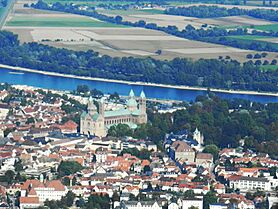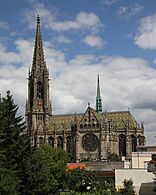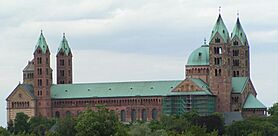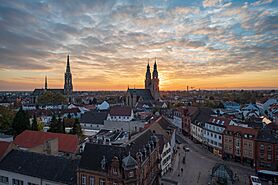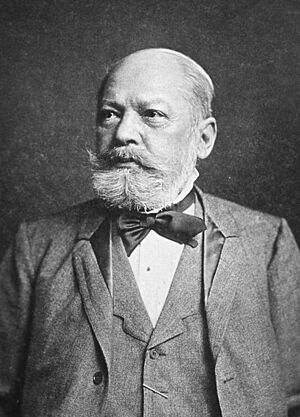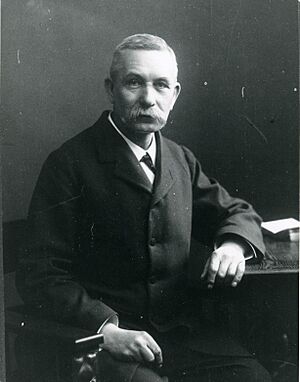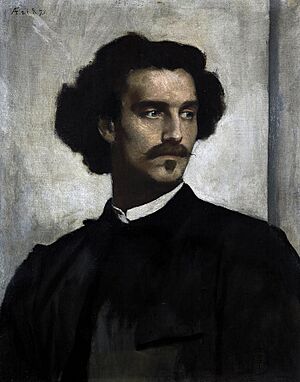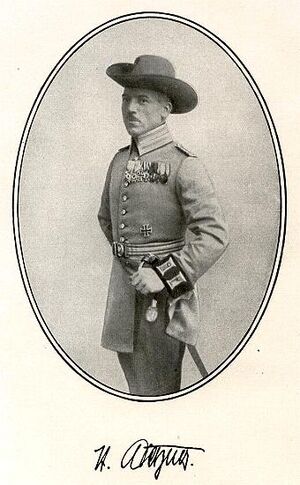Speyer facts for kids
Quick facts for kids
Speyer
Schbaija (Palatine German)
|
|||
|---|---|---|---|
|
|
|||
|
|||
| Country | Germany | ||
| State | Rhineland-Palatinate | ||
| District | Urban district | ||
| Elevation | 92 m (302 ft) | ||
| Population
(2022-12-31)
|
|||
| • Total | 51,368 | ||
| Time zone | CET/CEST (UTC+1/+2) | ||
| Postal codes |
67346
|
||
| Dialling codes | 06232 | ||
| Vehicle registration | SP | ||
| Website | www.speyer.de | ||
Speyer (pronounced "Shpy-er") is a historic city in western Germany. It is located in the state of Rhineland-Palatinate, right on the left bank of the Rhine river. About 50,000 people live in Speyer today.
This city is one of Germany's oldest. It was first built by the Romans as a strong fort on the edge of their Roman Empire. Speyer is famous for its amazing Speyer Cathedral, other old churches, and the "Old Gate" (called Altpörtel). Inside the Cathedral, you can find the tombs of eight Holy Roman Emperors and German kings.
Speyer is also known for a very important event in 1529: the Protestation at Speyer. This event led to the term "Protestantism." The city is also one of the "ShUM-cities," which were major centers of Jewish life in Europe during the Middle Ages. In 2021, Speyer's Jewish courtyard became a UNESCO World Heritage Site.
Contents
History of Speyer

The first names for this area were Noviomagus and Civitas Nemetum. These names came from a Germanic tribe called the Nemetes who lived there. The name Spira was first used in the 7th century. It came from a nearby Frankish settlement called villa Spira.
Important Dates in Speyer's History
- 10 BC: The Romans set up their first military camp here. It helped guard the Roman Empire's border.
- AD 150: The town appears on an old Greek map as Noviomagus.
- 346: A Christian bishop for the town is mentioned for the first time.
- 5th century: The original Roman town, Civitas Nemetum, is destroyed.
- 7th century: The town is rebuilt and named Spira.
- 1030: Emperor Conrad II starts building the Speyer Cathedral. Today, it is a UNESCO World Heritage Site. The first city wall is also built around this time.
- 1084: The first Jewish community is formed in Speyer.
- 1294: Speyer becomes a Free Imperial Town. This means it was a special city that answered directly to the Holy Roman Emperor, not a local lord.
- 1526: During the Protestant Reformation, the first Diet of Speyer (1526) allows some freedom for Lutheran teachings.
- 1529: At the second Diet of Speyer (1529), several German princes and states protest against new rules that would limit their religious freedom. This event is called the Protestation at Speyer. It is where the term "Protestant" comes from.
- 1689: French troops cause a lot of damage to the town.
- 1792-1814: Speyer is under French control during the French Revolutionary Wars and Napoleonic Wars.
- 1816: After Napoleon's defeat, Speyer becomes an important city in the Kingdom of Bavaria.
- 1883-1904: The Memorial Church is built. It remembers the Protestation of 1529.
- 1990: Speyer celebrates its 2000th birthday, just as Germany becomes a united country again.
What to See in Speyer
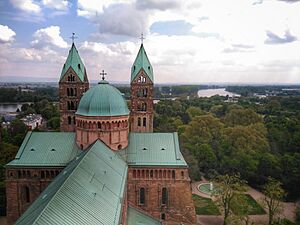

Speyer has many interesting places to visit:
- Cathedral: A huge, ancient church and a UNESCO World Heritage Site.
- Altpörtel: The impressive old town gate.
- Gedächtniskirche: A beautiful church built to remember the Protestation.
- Dreifaltigkeitskirche: Another important church, also known as Trinity Church.
- Jewish courtyard (Judenhof Speyer): The remains of a medieval synagogue and a special Jewish bath (mikve). This is a UNESCO World Heritage Site.
- Technikmuseum Speyer: A museum filled with cool transportation exhibits, like planes and cars.
- Historical Museum of the Palatinate: A museum about the history of the region.
Getting Around Speyer
Speyer has good transport links.
- Trains: The city is on the Schifferstadt-Wörth railway. You can take a train every hour to nearby cities like Mannheim and Karlsruhe.
- Airfield: Speyer also has a small airfield (Flugplatz Speyer) for general aviation. It's about 4 km south of the city center.
City Leaders (Mayors)
Since 1923, the head of the city has been called the Lord Mayor. Here are some of the people who have served as mayor:
- Philipp Lichtenberger (1904–1911)
- Ernst Hertrich (1911–1914)
- Otto Moericke (1917–1919)
- Karl Leiling (1919–1943, and again 1945–1946)
- Rudolf Trampler (1943–1945)
- Hans Hettinger (1946)
- Paul Schaefer (1946–1949)
- Paulus Skopp (1949–1969)
- Christian Roßkopf (1969–1995)
- Werner Schineller (1995–2010)
- Hansjörg Eger (2011–2018)
- Stefanie Seiler (since 2018)
Twin Towns – Sister Cities
Speyer has special partnerships with other cities around the world. These are called "twin towns" or "sister cities." They help promote friendship and understanding between different cultures.
Famous People from Speyer
Many interesting people were born in Speyer or lived there. Here are a few:
Born before 1900
- Samuel of Speyer (after 1096–death unknown): A scholar who explained Jewish texts.
- Julian of Speyer (before 1225– ~ 1250): A medieval choirmaster and composer.
- Georg von Speyer (1500–1540): An explorer for Spain in the Americas.
- Johann Joachim Becher (1635–1682): A doctor and early chemist.
- Anselm Feuerbach (1829–1880): A famous German painter.
- Henry Villard (1835–1900): A German-American journalist and railroad executive.
- Wilhelm Meyer (philologist) (1845–1917): A scholar of classical languages and medieval studies.
- Hans Purrmann (1880–1966): A painter and art collector.
- Hermann Detzner (1882–1970): A German officer in New Guinea.
Born after 1900
- George John Dasch (1903–1992): A spy during World War II who helped stop terrorist attacks in the United States.
- Jakob Brendel (1907–1964): An Olympic wrestler.
- Helmut Bantz (1921–2004): An Olympic gymnast.
- Gabriel Kney (born 1929): A Canadian builder of pipe organs.
- Jürgen Brecht (born 1940): An Olympic fencer.
- Axel Schimpf (born 1952): A Vice Admiral in the German Navy.
- Christoph Bechmann (born 1971): A German field-hockey player.
- Anke Vondung (born 1972): An opera singer.
- Lars Stindl (born 1988): A German football player.
- Elias Harris (born 1989): A German international basketball player.
See also
 In Spanish: Espira para niños
In Spanish: Espira para niños
 | Emma Amos |
 | Edward Mitchell Bannister |
 | Larry D. Alexander |
 | Ernie Barnes |


